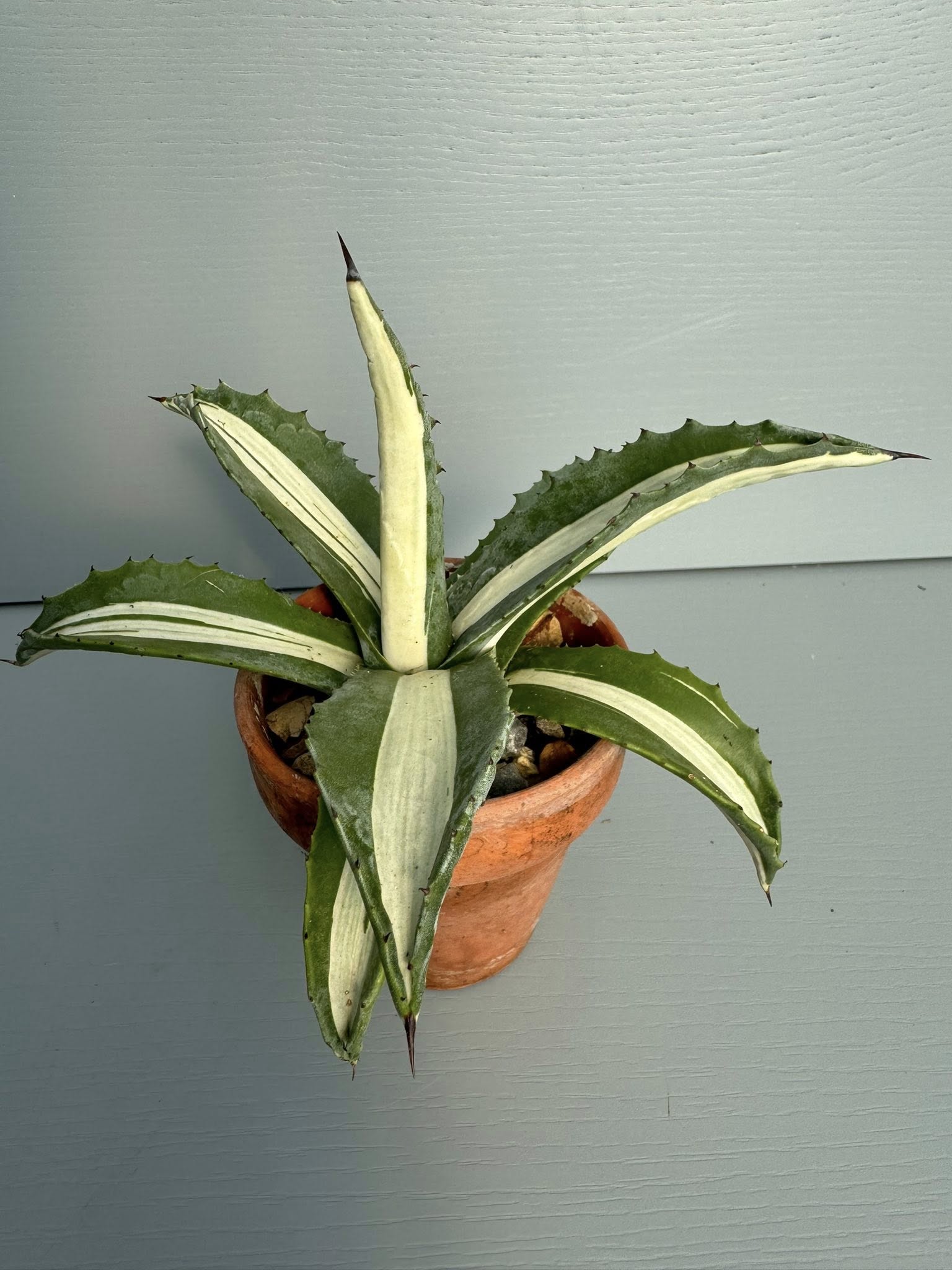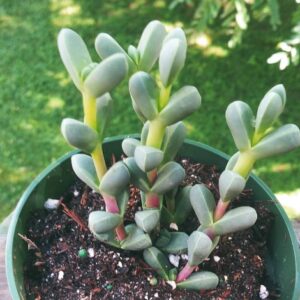🌿✨ Agave mediopicta ‘Alba’ — The Elegant Variegated Agave
Agave mediopicta ‘Alba’ is a stunning, slow-growing succulent known for its dramatic variegated leaves. A cultivar of Agave americana, this variety stands out due to its creamy-white central stripe flanked by blue-green leaf margins. Each leaf is edged with sharp teeth and terminates in a pointed spine, making it both architectural and ornamental.
Native to Mexico, Agave mediopicta ‘Alba’ is prized for its symmetrical rosette shape and is often featured in desert landscapes, rock gardens, and container displays. It combines beauty with drought tolerance, making it ideal for low-maintenance gardening.
🌿 Botanical Overview
Scientific Name: Agave americana var. mediopicta ‘Alba’
Family: Asparagaceae
Common Names: Century Plant ‘Alba’, Variegated Agave, Agave mediopicta alba
Origin: Mexico
Growth Habit: Symmetrical, solitary or sparsely offsetting rosette
Size:
Height: 2 to 3 feet (60–90 cm)
Spread: 2 to 4 feet (60–120 cm)
USDA Hardiness Zones: 8 to 11
🍃 Appearance
Leaves:
Thick, fleshy, sword-like leaves arranged in a rosette
Color: Central creamy-white stripe with blue-green margins
Edges lined with sharp, recurved teeth and a terminal spine
Leaf length: Up to 2 feet (60 cm) long
Flowers:
Flowers appear on a very tall stalk (up to 20 feet) after many years (typically 10–25 years)
Pale yellow to greenish flowers
Monocarpic: the plant dies after flowering, but often produces pups before or after flowering
☀️ Light Requirements
Outdoors:
Thrives in full sun
Can tolerate partial shade, but variegation is more vibrant in full sunlight
Indoors:
Needs the brightest spot possible, ideally near a south or west-facing window
May require supplemental grow lights in low-light conditions
🌡️ Temperature & Humidity
Temperature:
Prefers temperatures between 20–30°C (68–86°F)
Can tolerate heat but should be protected from freezing temperatures
Hardy down to around -6°C (20°F) if dry, but best overwintered indoors in cooler climates
Humidity:
Thrives in low humidity
Good air circulation helps prevent fungal issues
💧 Watering Routine
Spring to Autumn:
Water when the soil is completely dry
In warm weather, this may be every 10–14 days
Water deeply but ensure thorough drainage
Winter (Dormancy):
Water very sparingly — once a month or less
Only water if the leaves start to wrinkle
🚫 Avoid overwatering, as Agaves are highly susceptible to root rot.
🌱 Soil Requirements
Type:
Well-draining, gritty soil
Ideal mix:
50% cactus/succulent mix
25% coarse sand
25% pumice or perlite
pH: Slightly acidic to neutral (6.0–7.0)
Plant in containers with drainage holes to prevent water retention.
🌾 Fertilizing
Growing Season:
Fertilize once a month in spring and summer
Use a balanced, diluted succulent fertilizer (10-10-10 NPK)
Winter:
No fertilization needed during dormancy
✂️ Maintenance and Pruning
Remove:
Dead, damaged, or dried leaves from the base
Offsets (pups) if desired, to control size or for propagation
Wear gloves when handling due to sharp spines and teeth.
🌿 Propagation
Offsets (Pups):
The primary method of propagation
Gently separate pups from the base using a clean, sharp knife
Allow the offset to callous for 2–3 days
Plant in dry, well-draining soil and water lightly after a few days
Seeds: Rare, especially for variegated types, and often not true to type.
🛡️ Common Problems
Overwatering: Leads to root rot and fungal infections
Sunburn: Sudden exposure to intense sun can scorch leaves
Pests: Watch for:
Mealybugs
Agave Snout Weevil (particularly outdoors)
Scale insects
Leaf Spot: Fungal diseases can occur if kept in wet or humid conditions.
🎍 Decorative Use
Excellent for:
Rock gardens
Desert or xeriscape landscapes
Large decorative pots for patios
Indoor focal plants near bright windows
Its bold variegation and symmetrical form make it highly ornamental, even without flowering.
✅ Conclusion
Agave mediopicta ‘Alba’ is a spectacular, low-maintenance succulent that combines resilience with striking beauty. By providing full sun, minimal water, well-drained soil, and occasional feeding, this plant can thrive for years as a stunning centerpiece indoors or in drought-tolerant landscapes.





Reviews
There are no reviews yet.